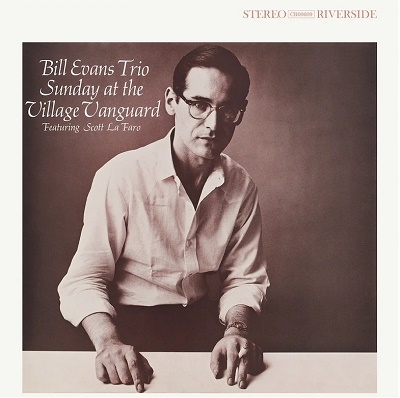現代アメリカ音楽の歴史の中で、「オリジナル・ジャズ・クラシック」という呼称がこれほどふさわしいアルバムはないだろう。このアルバムは、ビル・エヴァンス・トリオの伝説的な最終公演で録音された2枚のリヴァーサイド・アルバムのうちの1枚で、ヴィレッジ・ヴァンガードでの公演の最終日に、ベーシストのスコット・ラファロが悲劇の死を迎えるわずか10日前に収録された作品。
この録音は、エヴァンス、ラファロ、ポール・モチアンのトリオの特徴である三者間の交流の本質を捉えているとして、長い間評価されてきた。この頃のピアノ・トリオは、第一線のソリストの力量をリズミカルな伴奏で披露するのが主流だった。しかし、ビル・エヴァンス・トリオはそれとは異なるアプローチで、インタラクティブでバランスの取れたトリオを作り上げた。このアルバムはさらに、革新的なラファロのソロ作品と作曲に重点を置いていることが特徴である。
〈パーソネル〉Bill Evans (p) Scott Lafaro(b) Paul Motian(ds) 1961年6月25日、ニューヨーク、ヴィレッジ・ヴァンガードにてライヴ録音。
発売・販売元 提供資料(2023/05/10)
Sunday at the Village Vanguard is the initial volume of a mammoth recording session by the Bill Evans Trio, from June 25, 1961 at New York's Village Vanguard documenting Evans' first trio with bassist Scott LaFaro and drummer Paul Motian. Its companion volume is Waltz for Debby. This trio is still widely regarded as his finest, largely because of the symbiotic interplay between its members. Tragically, LaFaro was killed in an automobile accident ten days after this session was recorded, and Evans assembled the two packages a few months afterward. While "Waltz for Debby" -- in retrospect -- is seemingly a showcase for Evans' brilliant, subtle, and wide-ranging pianism, this volume becomes an homage, largely, to the genius and contribution of LaFaro. That said, however, this were never the point. According to Motian, when Evans built this trio based on live gigs at the Basin Street East, the intention was always to develop a complete interactive trio experience. At the time, this was an unheard of notion, since piano trios were largely designed to showcase the prowess of the front line soloist with rhythmic accompaniment. Here, one need listen no further than the elegant and haunting, graceful modal reading of "My Man's Gone Now" from Porgy & Bess to know that there is something completely balanced and indescribably beautiful in their approach. Motian's brushes whisper along the ride cymbals and both Evans and LaFaro enter into a dialogue that emerges from a darkly hued minor mode, into the melody and somehow beyond it, into a form of seamless dialogic improvisation to know that in the act of one musician slipping over and under another -- as happens with all three in an aural basket weave -- is something utterly new and different, often imitated but never replicated. But in a sense it happens before this, on LaFaro's "Gloria's Step," which opens the recording. His thematic statement includes the briefest intro, hesitant and spacious before he and pianist enter into a harmonic and contrapuntal conversation underscored by the hushed dynamics of Motian's snare, and the lightning-fast interlocutions of single string and chorded playing of LaFaro. The shapshifting reading of Miles Davis' "Solar," is a place where angularity, counterpoint, and early modalism all come together in a knotty and insistent, yet utterly seamless blend of post-bop aesthetics and expanded harmonic intercourse with Motian, whose work, while indispensable in the balance of the trio, comes more into play here, and is more assertive with his half-time accents to frame the counterpoint playing of Evans and LaFaro. This is a great place to begin with Evans. ~ Thom Jurek
Rovi
1961年にNYのヴィレッジ・ヴァンガードでの演奏を録音した作品。同じ日に録音された「ワルツ・フォー・デビイ」に比べてこちらはラファロに焦点を当てた選曲。 (C)ANCHOR
タワーレコード(2002/10/10)



